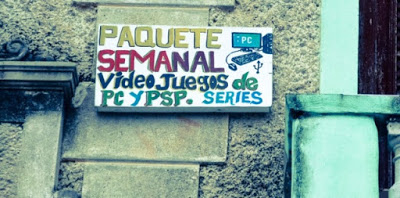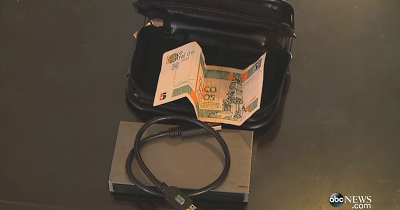Cuba USA
For several years, I've been tracking Cuba's "paquete semenal," a weekly distribution of entertainment, software, games, news, etc. on portable hard disks and flash drives.
I've noted that the compilation and distribution of the material is well organized and complete, leading to speculation that it is run by the Cuban government -- it generates revenue, provides jobs and acts as an "opiate of the masses" -- who needs the Internet when you have el paquete? (There is precedent -- there used to be a government storefront in Havana where one could bring floppy disks and get copies of the latest software releases).
Even if the government does not run el paquete, they turn a blind eye to its very visible advertising and distribution. In return, the package (like the illegal local area networks) does not include any politically sensitive material.

ABC News reports that el paquete is Cuba's number one private employer, bringing in $4 million a month.
They do not cite their sources, but it is not an outlandish claim. I don't know how many people are employed in the private sector, but, considering the goofy list of jobs that are eligible for self employment, it is believable that this popular, ubiquitous service could be the leading private employer.
And $4 million a month does not sound like a lot of revenue for such a widespread operation. According to the ABC report, terabyte hard drives with the week's material are delivered to customer's homes for 5 CUC (about $6.50). The subscriber copies as much as he or she wants and the drive is picked up the next day. That subscriber may in turn distribute material to others on flash drives or their own portable hard disks.

Elio Hector Lopez, who claims to be the head of el paquete, described a different price structure in a Forbes interview:
The following video gives a view of the distribution of el paquete:
It includes an interview of "Dany Paquete" (shown above), a 26-year old "who looks more like a lazy college sophomore than a kingpin of a national blackmarket of pirated media." He is one of two competing national distributors in Havana.
The documentary does not disclose details on the gathering of information, but suggests that editors in Miami and Havana select movies, music, etc. each week.
Dany sounds more like an MBA business man than a drug dealer and is unafraid to appear on camera. The Cuban government clearly tolerates el paquete. Even if officials are not being paid off, it satisfies many consumers, making them less likely to press for open Internet access. Had he been writing today, Karl Marx would have said "el paquete is the opium of the masses."
I recently had an opportunity to ask a senior State Department spokesman whether el paquete copyright violation had come up during discussions with the Cubans and he said "no," but the agenda of Bilateral Commission includes discussion of claims for damages. The focus will no doubt be on Cuban claims for damages resulting from the embargo and US claims for nationalized property -- might that be stretched to include "Orange is the New Black?"
-----
Update 11/25/2015
A recent news report sheds light on the economics of el paquete distribution. It features the video shown below -- an interview of an anonymous distributor of el paquete to end users. He pays $2 a week for the paquete and the price he charges his customers is a function of the amount of data they copy. For example, eight Gbytes costs 10 Cuban pesos, about 50 cents. To become a distributor, he had to invest in a computer -- an old tower PC -- and portable external hard drives.
Distributing el paquete is a side job. He earns about $32 a month, which he uses to buy extra food -- and he sees the latest episode of his favorite TV shows.
- Teaching Material For Cuba -- El Paquete Educativo?
Locations of deploying organizations and installations of the offline Khan Academy. The Khan Academy is arguably the most important source of online learning on the Internet. Over 39 million teachers and learners have used their collection of 57 innovative,...
- Might Cuba's Street Net, Snet, Become Legitimate?
In earlier posts, I have described Cuba's community mesh network, Street Net (SNET), and its relationship to the government. Cachivache Media has just published a post (in Spanish) on SNET, adding to my earlier description and suggesting that the...
- Paquete Semanal, S. A.
A legitimatized "Paquete Semanal, S. A." could distribute Netflix content in Cuba today. To the extent that we are allowed to see it, Cuba's plan for the Internet focuses on connectivity in homes and public places and support of areas that are considered...
- Cuba's Sneaker Net
Yaima Pardo, 34, in her home in Cuba as she describes her project PaSA (Paquete Semanal Autnomo), an independent weekly digital-media package for CubaA recent article (English or Spanish) describes the black market distribution of music, soap operas,...
- How Does One Post Material On The Cuban "sneaker Net?"
Warhol P has written a Havana Times post on the Cuban "sneaker net" -- the circulation of movies, TV shows, software, etc. on flash and hard disk drives. He reports prices of 50 Cuban Pesos (around $2) for 80 to 500 gigabytes of material and 10 Cuban...
Cuba USA
El paquete update -- Cuba's largest private employer?
For several years, I've been tracking Cuba's "paquete semenal," a weekly distribution of entertainment, software, games, news, etc. on portable hard disks and flash drives.
I've noted that the compilation and distribution of the material is well organized and complete, leading to speculation that it is run by the Cuban government -- it generates revenue, provides jobs and acts as an "opiate of the masses" -- who needs the Internet when you have el paquete? (There is precedent -- there used to be a government storefront in Havana where one could bring floppy disks and get copies of the latest software releases).
Even if the government does not run el paquete, they turn a blind eye to its very visible advertising and distribution. In return, the package (like the illegal local area networks) does not include any politically sensitive material.

ABC News reports that el paquete is Cuba's number one private employer, bringing in $4 million a month.
They do not cite their sources, but it is not an outlandish claim. I don't know how many people are employed in the private sector, but, considering the goofy list of jobs that are eligible for self employment, it is believable that this popular, ubiquitous service could be the leading private employer.
And $4 million a month does not sound like a lot of revenue for such a widespread operation. According to the ABC report, terabyte hard drives with the week's material are delivered to customer's homes for 5 CUC (about $6.50). The subscriber copies as much as he or she wants and the drive is picked up the next day. That subscriber may in turn distribute material to others on flash drives or their own portable hard disks.

Elio Hector Lopez, who claims to be the head of el paquete, described a different price structure in a Forbes interview:
Most customers get the drive at home, where they exchange it for last week’s drive and the equivalent of $1.10 to $2.20. (Distributors selling to other distributors charge ten times as much.)Regardless, $4 million seems plausible. Lopez went on to say that the original founding group had broken up, but evaded the interviewer's questions about operational details.
The following video gives a view of the distribution of el paquete:
It includes an interview of "Dany Paquete" (shown above), a 26-year old "who looks more like a lazy college sophomore than a kingpin of a national blackmarket of pirated media." He is one of two competing national distributors in Havana.
The documentary does not disclose details on the gathering of information, but suggests that editors in Miami and Havana select movies, music, etc. each week.
Dany sounds more like an MBA business man than a drug dealer and is unafraid to appear on camera. The Cuban government clearly tolerates el paquete. Even if officials are not being paid off, it satisfies many consumers, making them less likely to press for open Internet access. Had he been writing today, Karl Marx would have said "el paquete is the opium of the masses."
I recently had an opportunity to ask a senior State Department spokesman whether el paquete copyright violation had come up during discussions with the Cubans and he said "no," but the agenda of Bilateral Commission includes discussion of claims for damages. The focus will no doubt be on Cuban claims for damages resulting from the embargo and US claims for nationalized property -- might that be stretched to include "Orange is the New Black?"
-----
Update 11/25/2015
A recent news report sheds light on the economics of el paquete distribution. It features the video shown below -- an interview of an anonymous distributor of el paquete to end users. He pays $2 a week for the paquete and the price he charges his customers is a function of the amount of data they copy. For example, eight Gbytes costs 10 Cuban pesos, about 50 cents. To become a distributor, he had to invest in a computer -- an old tower PC -- and portable external hard drives.
Distributing el paquete is a side job. He earns about $32 a month, which he uses to buy extra food -- and he sees the latest episode of his favorite TV shows.
- Teaching Material For Cuba -- El Paquete Educativo?
Locations of deploying organizations and installations of the offline Khan Academy. The Khan Academy is arguably the most important source of online learning on the Internet. Over 39 million teachers and learners have used their collection of 57 innovative,...
- Might Cuba's Street Net, Snet, Become Legitimate?
In earlier posts, I have described Cuba's community mesh network, Street Net (SNET), and its relationship to the government. Cachivache Media has just published a post (in Spanish) on SNET, adding to my earlier description and suggesting that the...
- Paquete Semanal, S. A.
A legitimatized "Paquete Semanal, S. A." could distribute Netflix content in Cuba today. To the extent that we are allowed to see it, Cuba's plan for the Internet focuses on connectivity in homes and public places and support of areas that are considered...
- Cuba's Sneaker Net
Yaima Pardo, 34, in her home in Cuba as she describes her project PaSA (Paquete Semanal Autnomo), an independent weekly digital-media package for CubaA recent article (English or Spanish) describes the black market distribution of music, soap operas,...
- How Does One Post Material On The Cuban "sneaker Net?"
Warhol P has written a Havana Times post on the Cuban "sneaker net" -- the circulation of movies, TV shows, software, etc. on flash and hard disk drives. He reports prices of 50 Cuban Pesos (around $2) for 80 to 500 gigabytes of material and 10 Cuban...
